Calibration: Assessing Porfolio Defenses Transcript
Student: Hello everyone. Welcome to my college success portfolio defense.
Teacher: Being a teacher here requires you to be very close, like be up in front of your own learning.
Teacher: I’m curious to know where you stand on this really complicated issue.
Teacher: And be incredibly close to the learning of students.
Teacher: - huge round of applause—
Teacher: If we as a staff are not calibrated, then the validity of these defenses goes out the window.
Teacher: For students, the defense is the most important part. For us, this is the most important part.
Teacher: We do a lot of work throughout the year to make sure that we as a staff group understand the expectations of the defense, the purpose of the defense, the requirements of the defense—but then that we are all using the assessment tool in the same way.
Teacher: It is now our job to come up with our own argument. Did the student pass? Did the student pass with distinction? Should the student have to resubmit? We need to have evidence for that argument.
Teacher: Before we go into the full defense weeks, staff spends an entire day getting really, really clear on how to make sure that they know how to use the assessment tool to maintain a universal level of rigor and expectation.
Teacher: The most important thing is to be familiar with everything in the portfolio, but to be deeply with familiar with the cover level, an artifact that we’re assigned on our team, and the reflection of that artifact.
Student: Connect and communicate with your community.
Teacher: A student chooses to defend early. It’s usually an honor. The students who do this are students who are clearly working hard to be ahead of the game. If a student passes, they pass for real.
Teacher: The way that deliberation goes on the day of defenses when you are on your panel and you get to your quiet and private space when you deliberate, the best thing to do is to simply use the checklist as your guide.
Teacher: Student connect and applies learning from one area of study or point of view to another didn’t check until questioning.
Teacher: Okay. I didn’t check thinking critically use and application until question and answer.
Teacher: Great.
Student: Good morning everybody and welcome to my college success portfolio defense.
Teacher: On every panel, we try to have three staff members and then one student from every grade level represented.
Student: That’s why I was like, yeah, totally collaborating productively. I put that at the end, cuz I was like, I don’t think I got something solid for that.
Teacher: Then what we find is also that the student panelists can sometimes be the ones who push the most.
Student: What I would’ve liked to hear is like understanding what other people believe and why they believe that thing.
Teacher: I agree. I think tying it back to this idea of perspective would have really deepened things.
Teacher: For teachers, it’s really a chance for us to check our own understanding of what we’re expecting from students during the defense.
Teacher: If you wanna make an argument for whether or not you could check the first box of overall reflection.
Teacher: I think I was looking for maybe her to speak a little bit more about how the project itself helped her in terms of seeing some growth.
Teacher: I kind of felt like she did acknowledge that, and it wasn’t a follow up question, but she said like, “I’m now looking for any means to deliver the message to create knowers.” For that, that was clear evidence of her growth as a communicator.
Teacher: By getting as clear as we possibly can in the moment of how to use this assessment tool, then we can go forward confident that each room is going to be using the same level of rigor, the same expectations in order to determine if a student is going to pass or not.
Teacher: People to like acknowledge their areas of growth.
Teacher: The best moment is when a student is able to take what they’ve learned about defenses and apply that when watching a defense, and then use the checklist as a way to say, “Hold on a second. I have a different understanding, and let’s engage in a heightened discussion.”
Teacher: I don’t think I could have checked off that box from what I heard.
Interviewer: It’s where students take on the role of exactly what we’re asking them to do as deeper learners.
[End of Audio]

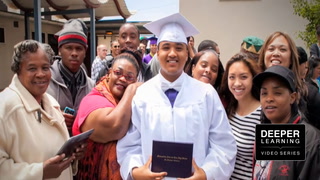
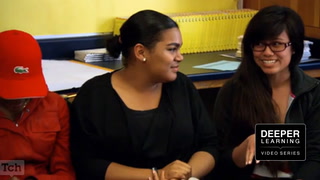
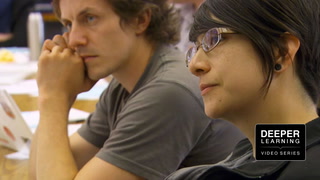
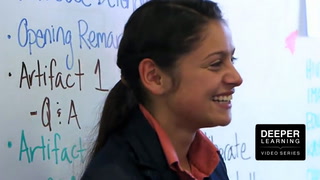
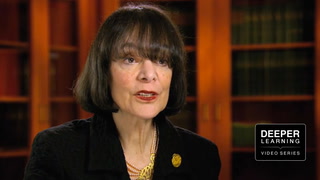








2 Comments
Patrcia Mesch May 12, 2016 1:38pm
Abby Chill Jan 27, 2015 2:20am